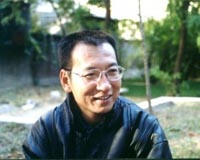 |
Beijing (AFP) Dec 26, 2009 A Beijing court on Friday sentenced leading dissident Liu Xiaobo to 11 years in prison for subversion, prompting the United States to accuse China of persecuting its political opponents. Rights groups lashed out at what they called a toughening of the political climate in China given the heavy jail term for Liu, 53, a writer who was previously jailed over the 1989 Tiananmen pro-democracy protests. Liu was tried for "inciting subversion of state power". He was detained a year ago after co-authoring Charter 08, a bold manifesto calling for the reform of China's one-party communist system and the protection of human rights. His case has generated concern in the West over China's human rights record, especially in the United States, which urged Beijing to "respect the rights of all Chinese citizens to peacefully express their political views". "We continue to call on the government of China to release him immediately," US embassy official Gregory May told reporters outside the courthouse following sentencing. The dissident's wife, Liu Xia -- who was able to see her husband for the first time since March -- told AFP that he had decided to appeal the verdict. "He will meet with his lawyers Monday and they will prepare the appeal," said Liu, who had not been allowed to attend Wednesday's trial but was present at her husband's sentencing. "We were able to meet for 10 minutes and we were all smiles when we spoke. I smiled so that he could be calm," she said. One of Liu's lawyers, Ding Xikui, said they had 10 days to file an appeal. A group of Western diplomats including May, who were denied access to Wednesday's proceedings, tried to attend Friday's hearing but were again refused, according to an AFP reporter at the courthouse. In a brief dispatch, the state Xinhua news agency reported the sentence but only on its English-language service, saying the court had "strictly followed the legal procedures in this case and fully protected Liu's litigation rights". Liu's conviction and sentence were strongly condemned by the European Union's presidency and the UN High Commissioner for Refugees (UNHCR). In Brussels, the EU presidency, currently held by Sweden, condemned the decision to jail Liu as "disproportionate," saying it raised concerns about freedom of speech and right to a fair trial in China. "The Presidency of the European Union is deeply concerned by the disproportionate sentence against the prominent human rights defender Liu Xiaobo," its statement said. Liu's sentence threw "an ominous shadow" over Beijing's commitments to human rights, according to Navi Pillay, the UN's human rights commissioner. "The conviction and extremely harsh sentencing... mark a further severe restriction on the scope of freedom of expression in China," Pillay said in a statement issued in Geneva. In Berlin, German Chancellor Angela Merkel said she regreted Liu's sentence, adding that "the Chinese government still heavily restricts freedom of expression and the press despite great progress in other areas." Rights groups said the sentence indicated tough times ahead for political opponents of China's communist rulers. "This reverses a trend seen over the past decade towards lighter sentences in subversion cases," Nicholas Bequelin, a senior researcher in the Asia division of Human Rights Watch, told AFP. The Dui Hua Foundation, a group set up to improve human rights by promoting China-US dialogue, said Liu's sentence was the toughest handed down for subversion since the crime was included in China's penal code in 1997. According to China Human Rights Defenders, an activist network, more than 10,000 people have signed the petition. And Amnesty International said it was "deeply concerned" for the other signatories of Charter 08. It said Liu's detention and trial "show that the Chinese government will not tolerate Chinese citizens participating in discussions about their own form of government." The subversion charge -- which one of Liu's lawyers, Shang Baojun, said also related to articles posted on the Internet -- is routinely brought against those who voice opposition to China's ruling Communist Party. Rights activists say China pushes cases such Liu's through the courts during the Western holiday season in a bid to attract less global attention. Share This Article With Planet Earth
Related Links China News from SinoDaily.com
 Liu Xiaobo: jailed Chinese intellectual sought change
Liu Xiaobo: jailed Chinese intellectual sought changeBeijing (AFP) Dec 25, 2009 Liu Xiaobo, who on Friday was jailed for 11 years by a Beijing court for subversion, is a leading intellectual and social critic who has sought to bring political change and democracy to China. The 53-year-old writer, who was previously jailed for his involvement in the 1989 Tiananmen pro-democracy protests, was arrested a year ago after co-writing Charter 08, a widely circulated petition th ... read more |
|
| The content herein, unless otherwise known to be public domain, are Copyright 1995-2009 - SpaceDaily. AFP and UPI Wire Stories are copyright Agence France-Presse and United Press International. ESA Portal Reports are copyright European Space Agency. All NASA sourced material is public domain. Additional copyrights may apply in whole or part to other bona fide parties. Advertising does not imply endorsement,agreement or approval of any opinions, statements or information provided by SpaceDaily on any Web page published or hosted by SpaceDaily. Privacy Statement |